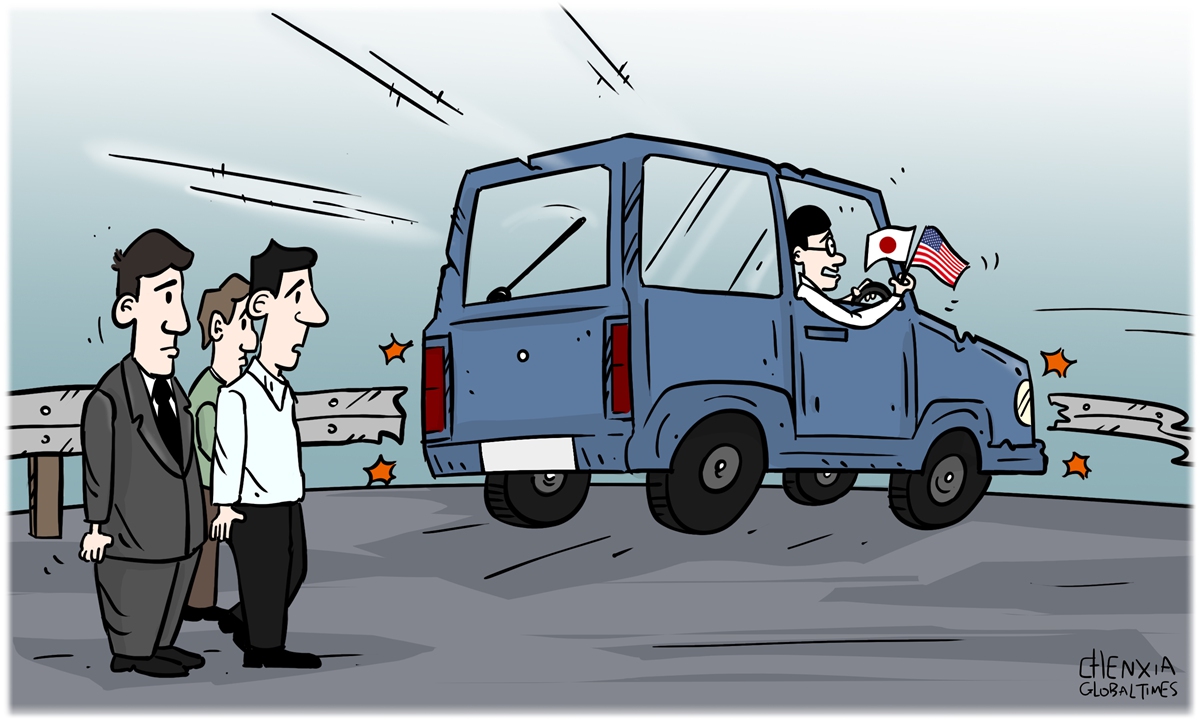
Illustration: Chen Xia/Global Times
Japanese Prime Minister Fumio Kishida seems to have a busy schedule over the next few weeks, meeting foreign leaders and paying a visit to Southeast Asia during which, as many analyze, he is expected to peddle sanctions against Russia on behalf of the US government.Besides hosting a so-called Quadrilateral Security Dialogue (Quad) meeting in May, Kishida plans to visit Indonesia - host of this year's G20 summit, Thailand and Vietnam starting late this month, and a trip to Europe is also being planned, according to the South China Morning Post.
Since the US initiated a wave of sanctions against Russia, Tokyo has been beating the drum for Washington, from banning imports of Russian-produced products, freezing the assets of hundreds of Russian individuals based in Japan, to revoking Russia's "most favored nation" trade status on Wednesday.
As the US' most loyal ally in Asia, it is not beyond expectations for Japan to take such a stance. However, Japan's attempts to lure other Asian countries into the US-led sanctioning-Russia group would be a totally different story, as it goes against the essential interest of ASEAN and other Asian countries which are focused on maintaining peace and stability in the region and developing their economies.
It is not hard to understand that abusing the sanctioning tools is never an effective approach to settle disputes. Imposing economic sanctions on a country will only create disruptions and difficulties to the economy and make many ordinary people's life harder. Also, sanctions will ultimately backfire.
Yet, the US and its allies have been relentlessly imposing economic sanctions on other countries in order to serve the US' global hegemony. Since 2011, the US has imposed more than 100 sanctions on Russia, with even Russian cats and dogs being punished.
Actually, India, which is also a member of the Quad, has set an example by keeping its independent foreign policy while facing the US pressure. New Delhi has tried out the unique rupee-ruble trade payment scheme to keep importing oil and other commodities from Russia.
Indian External Affairs Minister Subrahmanyam Jaishankar said on April 11 frankly during a press conference after the "India-US 2+2 Dialogue" that India was against to the US officials' censure of Indian human rights, saying the US needs to look itself in the mirror on the issue of human rights.
Earlier, the Japanese prime minister travelled to New Delhi, on behalf of the US, to persuade India to condemn Russia, but he was snubbed. Now, Japan is again cajoling ASEAN countries to take the side of the US.
For many years, ASEAN has enjoyed a peaceful and stable environment that has enabled the region to attain rapid economic growth and improvement in the people's living standards. ASEAN does not want the stability in the region to be upended.
It is believed that the Southeast Asian countries have the determination and wisdom to uphold regional stability despite the mounting pressure from the US and Japan. Only in this way can the fundamental interests of the Southeast Asian countries be safeguarded.
The author is an editor with the Global Times. bizopinion@globaltimes.com.cn
